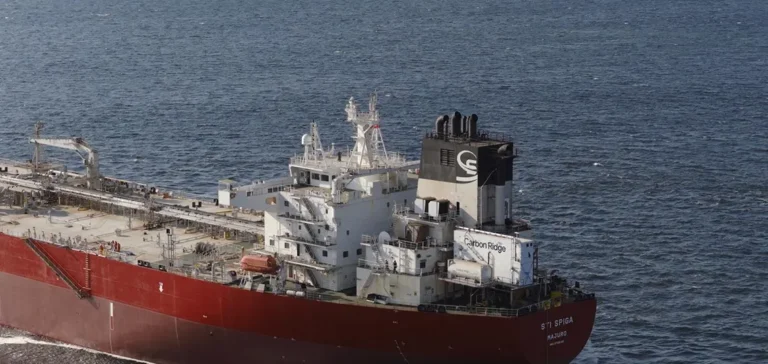The maritime sector has witnessed a technological breakthrough with Carbon Ridge’s installation of a centrifugal carbon capture system on a Scorpio Tankers Inc. tanker. This pilot project, carried out in partnership with Scorpio Tankers Inc., marks the first use of an onboard centrifugal carbon capture system (OCCS) on a vessel, establishing Carbon Ridge as a pioneer of this technical solution in maritime transport.
Technological deployment on the STI SPIGA
The unit, named “Lone Ranger,” was installed on the STI SPIGA tanker, an LR2 vessel used for transporting refined petroleum products. The operation took place at the Besiktas shipyard in Turkey in July. Carbon Ridge’s OCCS system is based on a modular design aimed at reducing initial investments and operational costs while maintaining higher capture efficiency compared to traditional technologies. According to provided data, the device enables a reduction of up to 75% in space requirements compared to conventional CO2 capture columns.
Thanks to flexible installation—either vertical or horizontal depending on the vessel’s configuration—this technology meets the needs of international fleets and addresses the sector’s growing regulatory compliance demands. The captured carbon dioxide (CO2) is then compressed, liquefied, and stored on board the vessel throughout the voyage.
Financing and industrial integration
Carbon Ridge has announced the closing of a new financing round led by Katapult Ocean and Alfa8, with participation from Crosscut Ventures and Berge Bulk. This new funding brings the company’s total raised to over $20mn (around EUR18.5mn). This capital injection is intended to support the industrialisation and commercialisation of the OCCS technology among shipowners aiming to meet international emissions reduction requirements.
The system’s modular architecture facilitates integration on both newbuild and existing vessels, without requiring major modifications to propulsion systems. The OCCS solution developed by Carbon Ridge is compatible with all fuel types, offering shipowners and charterers an additional option to anticipate the rise of global environmental regulations.
Market outlook and strategy
The pilot project on the STI SPIGA represents a key step for the industrial validation and future commercial adoption of this technology. Project partners emphasise the need for effective and adaptable solutions to support the decarbonisation of maritime transport, as regulatory pressure intensifies worldwide.
Implementing a carbon capture system dedicated to the maritime sector opens up new prospects for on-board CO2 management, from capture to temporary storage, while integrating logistical solutions for the subsequent delivery of the captured gas. According to representatives of the involved companies, the success of this testing phase will determine the expansion of deployment to other units in the fleet and could influence the sector-wide adoption of the technology.






















